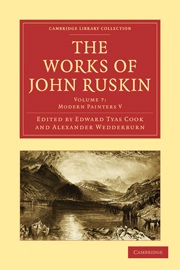Book contents
- Frontmatter
- Contents
- LIST OF ILLUSTRATIONS
- INTRODUCTION TO THIS VOLUME
- BIBLIOGRAPHICAL NOTE
- Modern Painters, Vol. V.
- PREFACE
- PART VI “OF LEAF BEAUTY”
- PART VII “OF CLOUD BEAUTY”
- PART VIII “OF IDEAS OF RELATION:—FIRST, OF INVENTION FORMAL”
- PART IX “OF IDEAS OF RELATION:—SECOND, OF INVENTION SPIRITUAL”
- CHAP. I THE DARK MIRROR
- CHAP. II THE LANCE OF PALLAS
- CHAP. III THE WINGS OF THE LION
- CHAP. IV DÜRER AND SALVATOR
- CHAP. V CLAUDE AND POUSSIN
- CHAP. VI RUBENS AND CUYP
- CHAP. VII OF VULGARITY
- CHAP. VIII WOUVERMANS AND ANGELICO
- CHAP. IX THE TWO BOYHOODS
- CHAP. X THE NEREID'S GUARD
- CHAP. XI THE HESPERID ÆGLÉ
- CHAP. XII PEACE
- EPILOGUE (1888)
- APPENDIX
- Plate section
CHAP. VII - OF VULGARITY
Published online by Cambridge University Press: 07 September 2011
- Frontmatter
- Contents
- LIST OF ILLUSTRATIONS
- INTRODUCTION TO THIS VOLUME
- BIBLIOGRAPHICAL NOTE
- Modern Painters, Vol. V.
- PREFACE
- PART VI “OF LEAF BEAUTY”
- PART VII “OF CLOUD BEAUTY”
- PART VIII “OF IDEAS OF RELATION:—FIRST, OF INVENTION FORMAL”
- PART IX “OF IDEAS OF RELATION:—SECOND, OF INVENTION SPIRITUAL”
- CHAP. I THE DARK MIRROR
- CHAP. II THE LANCE OF PALLAS
- CHAP. III THE WINGS OF THE LION
- CHAP. IV DÜRER AND SALVATOR
- CHAP. V CLAUDE AND POUSSIN
- CHAP. VI RUBENS AND CUYP
- CHAP. VII OF VULGARITY
- CHAP. VIII WOUVERMANS AND ANGELICO
- CHAP. IX THE TWO BOYHOODS
- CHAP. X THE NEREID'S GUARD
- CHAP. XI THE HESPERID ÆGLÉ
- CHAP. XII PEACE
- EPILOGUE (1888)
- APPENDIX
- Plate section
Summary
§ 1. Two great errors, colouring, or rather discolouring, severally, the minds of the higher and lower classes, have sown wide dissension, and wider misfortune, through the society of modern days. These errors are in our modes of interpreting the word “gentleman.”
Its primal, literal, and perpetual meaning is “a man of pure race”; well bred, in the sense that a horse or dog is well bred.
The so-called higher classes, being generally of purer race than the lower, have retained the true idea, and the convictions associated with it; but are afraid to speak it out, and equivocate about it in public; this equivocation mainly proceeding from their desire to connect another meaning with it, and a false one;—that of “a man living in idleness on other people's labour”;—with which idea the term has nothing whatever to do.
The lower classes, denying vigorously, and with reason, the notion that a gentleman means an idler, and rightly feeling that the more any one works, the more of a gentleman he becomes, and is likely to become,—have nevertheless got little of the good they otherwise might, from the truth, because, with it, they wanted to hold a falsehood,—namely, that race was of no consequence. It being precisely of as much consequence in man as it is in any other animal.
§ 2. The nation cannot truly prosper till both these errors are finally got quit of.
- Type
- Chapter
- Information
- The Works of John Ruskin , pp. 343 - 362Publisher: Cambridge University PressPrint publication year: 2010First published in: 1903

